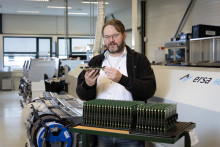Sam Fassbender has been helping people with autism find work every day for the past five years. She completed a specialised training course in Belgium, taught by several internationally renowned coaches. As a recruiter at a job placement agency for people on the spectrum, this is both her area of expertise and her personal mission: ‘I want to make the corporate world more autism-friendly.’
Sam Fassbender
She believes people with autism deserve a fair chance. ‘Research shows that they are, on average, significantly more productive than neurotypical employees – provided that companies trust them and take the right approach. They’re analytical, think outside the box, are straightforward and incredibly honest. On top of that, they’re extremely loyal and fully committed if you give them the opportunity.’
She shares how she has already helped several people secure jobs at TU Delft. ‘For instance, in the Aerospace department’s finance administration team. That’s where they really thrive.’
Questionnaire
Fassbender looks for the right match between an autistic candidate and a workplace, and then guides them through the application process. ‘Candidates who register with us first complete an autism-friendly questionnaire. I don’t focus on CVs – I look at what drives someone and what they need. I’ve been trained in interviewing techniques, so I can quickly get to the heart of things. Because I know the employers well, I can usually tell straight away if it’s a good fit. And nine times out of ten, they get invited.’
Autism template
When it gets to that stage, Fassbender prepares the candidate with what she calls an ‘autism template’. ‘I try to arrange as much as possible in advance to make the process predictable. So the candidate already knows what the work environment looks like, what the company culture is like, and what the general atmosphere is. I also help them prepare examples from their own life that they can use to answer typical interview questions.’
On the other side, she prepares employers with a brochure full of practical tips: ‘Make it clear in advance who will be attending the interview and what their role is. Provide practical information about how to access the building and parking. Begin the interview with a clear structure, ask closed or clearly defined questions wherever possible, and avoid irony or ambiguity. Give the candidate time to formulate a response and focus on content.’
Fassbender supports around seven job applicants per week. If a placement is successful, a colleague takes over to guide the initial work period. ‘At first, they’re seconded through us, but the ultimate goal is a permanent position.’
 Sharing tips and experiences
Sharing tips and experiences
Mireille Howard-Snels is a Senior Policy Advisor for Education & Students at TU Delft. She also has autism, ADHD and is intellectually gifted – making her a true expert by experience. ‘I know I struggle with eye contact and might come across as distant. But that says nothing about how well I do my job.’
At TU Delft, she founded DiversAbility, a staff network where, among others, neurodiverse colleagues can share experiences. They also exchange tips on how to navigate workplace situations, such as job interviews. The group now has around sixty members.
‘I always advise people not to open with the fact that they have autism. There’s still too much ignorance. In my experience, people often think you’re some kind of ‘Rain Man’. They see it as a limitation, while in reality autism manifests differently in every individual. My autistic brother, for example, really cannot manage a regular job – but I do just fine, as long as my work environment meets certain criteria.’
No open-plan offices
She describes how she once asked to see her future workspace during a job interview – and was allowed to. ‘That was brilliant, because it let me see where I would be working. I really can’t handle noisy open-plan offices. I also work with noise-cancelling headphones, which really helps reduce sensory overload. But I’m most productive when I’m allowed to work from home.’
Preparation is key
She also has tips for neurodiverse jobseekers: ‘Do your research beforehand – find out how the company deals with diversity and autism. But also write down what your autism means in terms of work, and what you need to function at your best. Think in advance about which questions you want to ask during the interview – like I did when I asked to see the workplace.’
If all those answers come out positive, you’re in a good place. ‘You’re starting to see HR departments receiving training in this area. As long as people can recognise the strengths you bring – and don’t try to micromanage.’
Horizon and Student Onbeperkt
Besides advising neurodiverse candidates, Howard-Snels also shares tips with HR teams, and is an advisor to student platform Student Onbeperkt (Student Enabled) and the Horizon helpdesk. The first initiative brings together students with disabilities in open dialogue sessions, while Horizon supports students with autism, for example by helping them apply for extra exam time or personalised learning adjustments.
Fassbender has just come out of an interview. ‘Yes, it went brilliantly. I think it’ll lead to a placement. Autistic people really are golden employees.’
4tu career special
 This article appeared in the 4TU Career Special, a shared publication by the news editors of Cursor TU Eindhoven (Technische Universiteit Eindhoven University of Technology), TU Delta (TU Delft University of Technology), Resource Wageningen UR (Wageningen University & Research) and U-Today (University of Twente).
This article appeared in the 4TU Career Special, a shared publication by the news editors of Cursor TU Eindhoven (Technische Universiteit Eindhoven University of Technology), TU Delta (TU Delft University of Technology), Resource Wageningen UR (Wageningen University & Research) and U-Today (University of Twente).
The magazine came into being in collaboration with industry, and is explicitly aimed towards students who are either in the final phase of their studies, or have just graduated.




 Sharing tips and experiences
Sharing tips and experiences




